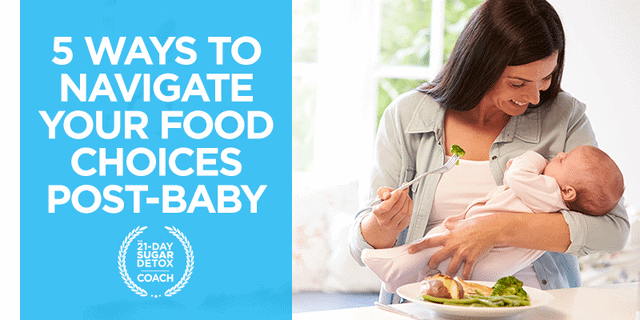Hey Folks! We're excited to welcome Certified 21DSD Coach Anisa Woodall. Anisa's article is part of a series contributed by our Certified 21DSD Coaches. Enjoy! – Diane and Team
Six months ago, I gave birth to the love of my life. Because I’ve supported other women in the pregnancy/breastfeeding journey in my clinical practice, I knew that the Fourth Trimester is a period necessitating rest and dependence on your “village.” Going into this period myself, I wanted to be as prepared as possible, nourishing my body to optimize milk production and healing without spending all my time in the kitchen.
I found I was wanting to eat all the things when my milk supply was normalizing. One day I tracked my calories just out of curiosity and I had already had 2700 kcals and was still asking my husband for a protein shake after putting baby down at 8pm! It’s true it takes more calories than pregnancy to fuel lactation, so constantly check in with your body to make sure you’re getting the nutrition you need.
Here are 5 things that worked for me to keep the sugar monster at bay:
#1. Prepare foods ahead of time or schedule a meal train.
Eating real, nourishing, whole foods is a huge priority for me so I began stocking my freezer with meals and bone broth while I was pregnant to have available when I needed it. Since I had prepared enough food, I didn’t need many donations but I highly recommend organizing a meal train if you need it. Friends and family are always asking for ways they can help; this is a very easy way for them to contribute. You can even specify dietary preferences or link favorite recipes. Best foods for postpartum are grounding, warming foods like roasted root vegetables, well-cooked meats, soups/broths, and warming teas.
#2. Rely on ingredient meals.
This is where following the 21DSD guidelines can be invaluable. When you’ve got a baby to care for and limited time to prepare meals, having well-regulated blood sugar will do so much for preventing cravings, optimizing sleep quality, and balancing mood.
Once you’ve run out of freezer meals and delivered meals, I recommend keeping it really simple. Priorities: protein, fats, vegetables, and starches. You may find that you are wanting a lot of starches in the initial months as your milk supply is normalizing. Listen to your body and source from whole foods as much as possible. I loved batch cooking sweet potatoes, squash, and beets to have on hand when protein and fat just wasn’t enough. Frozen peas are also super easy to whip up. Of course, all of these are best enjoyed with a generous dollop of butter or ghee. Breastmilk is 50% fat so having generous portions of healthy fats like butter, coconut oil, avocado, olives/olive oil, and cold-water fatty fish will ensure your baby is well-nourished.
The slow-cooker will be your friend during this time. The naturally gelatin-rich BBQ Pulled Pork or the Whole Chicken recipes from The 21DSD Daily Guide are great proteins to prepare and plan to have for future meals.
#3. Be open to a new sleep schedule.
Remember how you felt that time you pulled an all-nighter in college? You just wanted all the sugar and carbs, right? The same goes for postpartum: if you are lacking sleep, your physiology will adapt to create more sugar cravings while also decreasing insulin sensitivity.
You’ve no doubt heard the advice “Sleep when the baby sleeps.” This was the main way I got any rest. Nature has a clever way of “forcing” new mothers to rest; if a baby is attached to your breast around the clock for the first few months, it’s a bit challenging to not lie down and take rest. My advice: put your phone down or even out of reach during a few nursing-sleeping sessions per day so you’re not tempted to scroll social media. With all the hours of nursing, it can be easy to mindlessly scroll when you need to be prioritizing rest.
Get to bed when baby goes down for the night. Babies tend to wake up earlier in the morning (and that’s when milk production is highest anyway!), so do your best to rest up in those precious sleep hours from 9 pm to 2 am.
#4. Intentionally surround yourself with healthy food options.
If you’re trying to be mindful of balancing your blood sugar postpartum, avoid keeping packaged sugary treats around the house. When you’re hungry and tired in the middle of the night, of course the thing that is most convenient and highly palatable will sound like the best option. Some better alternatives: EPIC bars or beef jerky, 21DSD Lactation Cookies, pre-made protein smoothies, or 21DSD banana bread with nut butter.
#5. Eat mindfully.
If mindful eating is a new concept to you, don’t worry. Sometimes it’s challenging to distinguish between the voice of the sugar monster and your inner body’s inner wisdom. Begin by slowing down. Before putting something in your mouth, ask yourself these questions:
- Why am I choosing to eat? (Hunger, boredom, craving, loneliness, fatigue?)
- What outcome am I expecting through eating this food?
- How is this food nourishing me and my baby? (Leave guilt, blame, shame out of this.)
- What is a better alternative that helps relieve the feeling without indulging? (Activity or food.)
After you’ve asked yourself these questions and you still choose to enjoy your chosen food, proceed by taking a few slow breaths and stay present as you are enjoying your food. Envision it nourishing you and your baby. Stop eating once the food is no longer serving its purpose. This practice can do so much for optimizing digestion and metabolism while also helping you to limit your intake to only as much as you need.
I hope these tips help you in your postpartum journey! I’d love to hear from you: what tips have you found helpful? Connect with me on Instagram @anisawoodallnutrition and let me know!
 Anisa Woodall is a Certified Nutritionist, 21-Day Sugar Detox Certified Coach and mama to Idin. Her life’s purpose is to empower women to live, eat and move with intention and confidence. Anisa’s hope is to inspire a love for nature and sustainable living through her work. She holds a MS degree in Clinical Nutrition and Dietetics and a BS degree in Nutrition and Exercise Science from Bastyr University, the leading institution in natural medicine. She works with clients 1-on-1 at an integrative medical clinic in Issaquah, WA and online and holds regular 21-Day Sugar Detox Coaching groups.
Anisa Woodall is a Certified Nutritionist, 21-Day Sugar Detox Certified Coach and mama to Idin. Her life’s purpose is to empower women to live, eat and move with intention and confidence. Anisa’s hope is to inspire a love for nature and sustainable living through her work. She holds a MS degree in Clinical Nutrition and Dietetics and a BS degree in Nutrition and Exercise Science from Bastyr University, the leading institution in natural medicine. She works with clients 1-on-1 at an integrative medical clinic in Issaquah, WA and online and holds regular 21-Day Sugar Detox Coaching groups.

